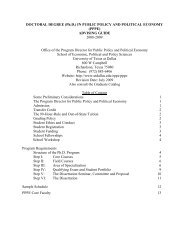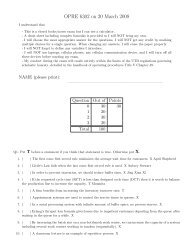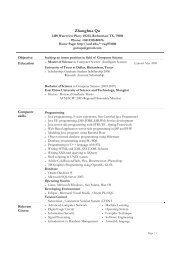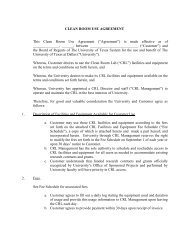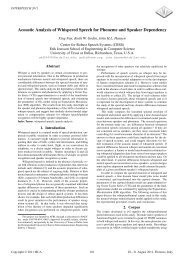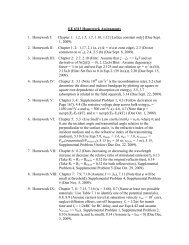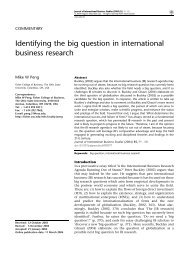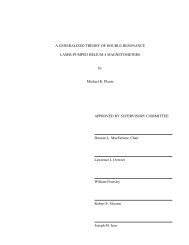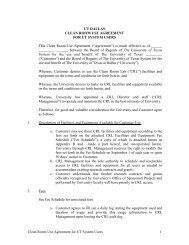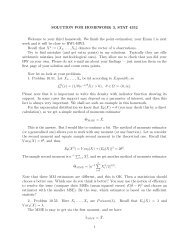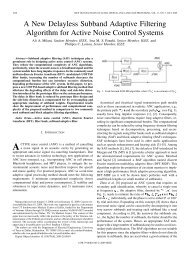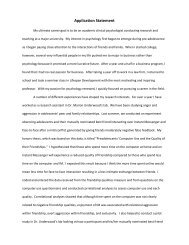Behind Intermediary Performance in Export Trade - The University of ...
Behind Intermediary Performance in Export Trade - The University of ...
Behind Intermediary Performance in Export Trade - The University of ...
You also want an ePaper? Increase the reach of your titles
YUMPU automatically turns print PDFs into web optimized ePapers that Google loves.
when deal<strong>in</strong>g with unfamiliar foreign<br />
customers (Tung, 1988; Weiss, 1994).<br />
In such negotiations, exporters may f<strong>in</strong>d<br />
their lack <strong>of</strong> experience <strong>in</strong> foreign markets<br />
to be compounded by their lack<br />
<strong>of</strong> understand<strong>in</strong>g <strong>of</strong> the <strong>in</strong>tricacies <strong>of</strong><br />
culturally derived negotiation norms<br />
(Lewicki, et al., 1994). Even when they<br />
try to handle the negotiations by themselves,<br />
they may f<strong>in</strong>d themselves parties<br />
to bad deals. In contrast, export <strong>in</strong>termediaries<br />
can <strong>of</strong>ten lower negotiation<br />
costs because <strong>of</strong> their expertise. Other<br />
th<strong>in</strong>gs be<strong>in</strong>g equal, they may help produce<br />
a better deal for their clients. <strong>The</strong>refore,<br />
by possess<strong>in</strong>g an <strong>in</strong>tangible resource<br />
embodied <strong>in</strong> the ability to handle<br />
export negotiations, <strong>in</strong>termediaries can<br />
<strong>in</strong>crease their odds <strong>of</strong> be<strong>in</strong>g selected.<br />
Thus:<br />
Hypothesis 2: <strong>The</strong> better the <strong>in</strong>termediary’s<br />
ability to handle export negotiations,<br />
the stronger its performance.<br />
Monitor<strong>in</strong>g/Enforcement Cost<br />
M<strong>in</strong>imiz<strong>in</strong>g<br />
Once contracts are signed, parties are<br />
concerned with the ex post monitor<strong>in</strong>g<br />
and enforcement <strong>of</strong> contractual obligations.<br />
Nonperformance may result from<br />
foreign buyers’ misunderstand<strong>in</strong>g <strong>of</strong><br />
contract specifics due to cultural differences,<br />
or from their deliberate opportunistic<br />
behavior (Williamson, 1985). <strong>Export</strong>ers<br />
directly deal<strong>in</strong>g with foreign<br />
buyers must be constantly on guard for<br />
such hazards. Thus, <strong>in</strong>termediaries that<br />
can help lower these costs will be<br />
sought.<br />
However, for the same reason monitor<strong>in</strong>g<br />
and enforcement costs may be high<br />
for firms engag<strong>in</strong>g <strong>in</strong> direct export, these<br />
costs may also be daunt<strong>in</strong>g when employ<strong>in</strong>g<br />
<strong>in</strong>termediaries. As agents, export<br />
<strong>in</strong>termediaries may have an <strong>in</strong>cen-<br />
MIKE W. PENG, ANNE S. YORK<br />
tive to behave <strong>in</strong> ways not always <strong>in</strong> the<br />
best <strong>in</strong>terest <strong>of</strong> pr<strong>in</strong>cipals, such as monopoliz<strong>in</strong>g<br />
the <strong>in</strong>ternational communication,<br />
not pay<strong>in</strong>g enough attention to<br />
exporters’ needs, or simply fail<strong>in</strong>g to perform<br />
as promised. As a result, exporters<br />
need to compare the monitor<strong>in</strong>g/enforcement<br />
costs <strong>of</strong> go<strong>in</strong>g through <strong>in</strong>termediaries<br />
vis-à-vis the monitor<strong>in</strong>g/enforcement<br />
costs <strong>of</strong> go<strong>in</strong>g direct to market. <strong>The</strong> challenge<br />
for <strong>in</strong>termediaries, therefore, is<br />
how to ensure exporters that the monitor<strong>in</strong>g/enforcement<br />
costs <strong>of</strong> us<strong>in</strong>g <strong>in</strong>termediary<br />
services are lower than these<br />
costs that exporters would have <strong>in</strong>curred<br />
via direct export.<br />
S<strong>in</strong>ce many <strong>in</strong>termediary activities are<br />
not directly verifiable, a key strategy is to<br />
use observable actions to signal to pr<strong>in</strong>cipals<br />
that <strong>in</strong>termediaries are honest and<br />
trustworthy (Spence, 1973). <strong>The</strong>refore,<br />
the best-perform<strong>in</strong>g <strong>in</strong>termediaries are<br />
likely to be those with the best signal<strong>in</strong>g<br />
capabilities. This can be accomplished<br />
through outcome and/or behavioral<br />
means. An outcome-based signal is to<br />
take title to the goods. 6 Inexperienced<br />
exporters may have a difficult time monitor<strong>in</strong>g<br />
the efforts <strong>of</strong> <strong>in</strong>termediaries.<br />
<strong>The</strong>refore, exporters may prefer to work<br />
with <strong>in</strong>termediaries will<strong>in</strong>g to take possession<br />
<strong>of</strong> the goods, <strong>in</strong> effect, bond<strong>in</strong>g<br />
the exporters aga<strong>in</strong>st f<strong>in</strong>ancial loss by<br />
transferr<strong>in</strong>g that risk to <strong>in</strong>termediaries<br />
(Jensen and Meckl<strong>in</strong>g, 1976). Such an<br />
arrangement solves a major problem <strong>in</strong>herent<br />
<strong>in</strong> a pr<strong>in</strong>cipal-agent relationship<br />
by achiev<strong>in</strong>g the complete alignment <strong>of</strong><br />
the <strong>in</strong>terests <strong>of</strong> both parties. By transform<strong>in</strong>g<br />
<strong>in</strong>termediaries from agents to<br />
pr<strong>in</strong>cipals, exporters no longer need to<br />
<strong>in</strong>cur expensive monitor<strong>in</strong>g and enforcements<br />
costs. S<strong>in</strong>ce not all <strong>in</strong>termediaries<br />
are able or will<strong>in</strong>g to take title, then <strong>in</strong>termediaries<br />
which agree to do so send<br />
an unambiguous signal to potential cli-<br />
VOL. 32, NO. 2,SECOND QUARTER, 2001 333



